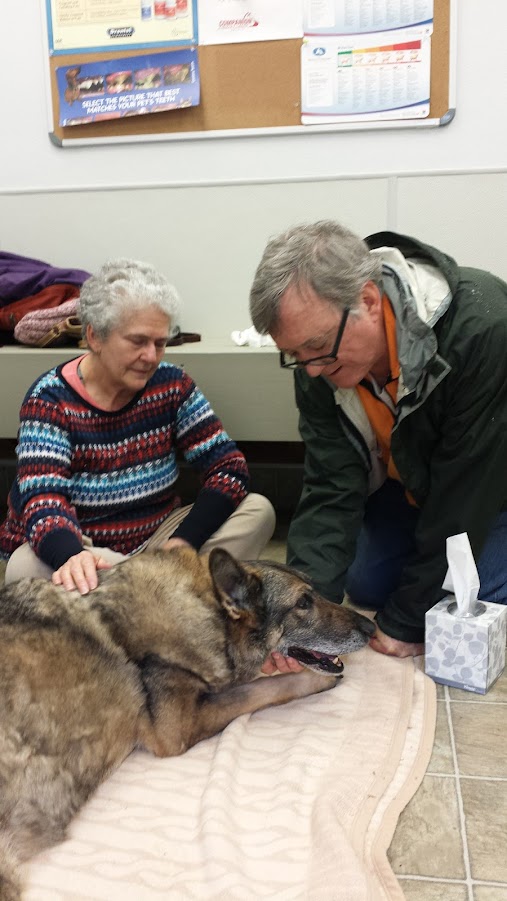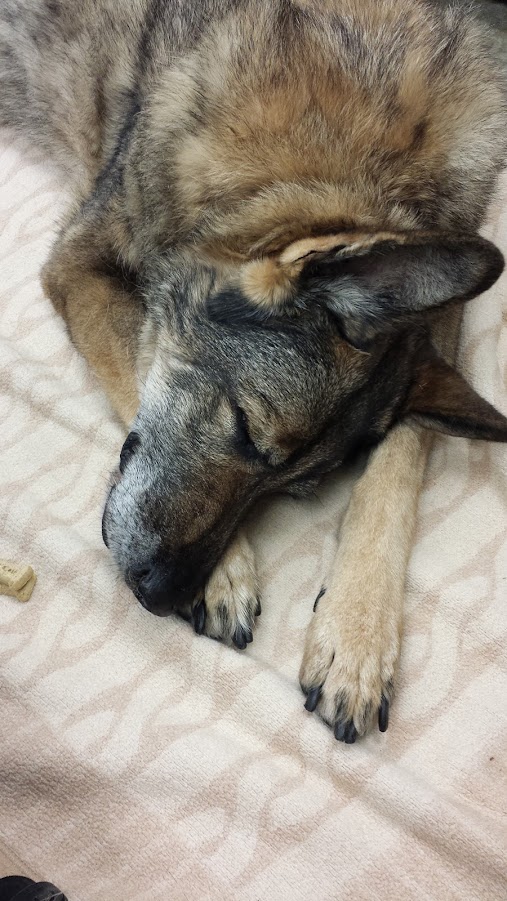Deborah J. Ross's Blog, page 102
January 2, 2017
In Troubled Times: Tenaciously Hopeful
 Recently, I’ve noticed more articles on staying grounded in joy and hope, even when surrounded by fear. Perhaps such articles have always been part of the general social media discourse and I am only now becoming sufficiently calm to notice them. But I rather think (hope!) this is a trend. In me, it certainly is. After the initial rounds of fear and trepidation, the constant adrenaline wore off. I’m not naturally a person who enjoys being fearful; from my experience training dogs, I suspect it’s not an appealing state for most of us. Some, I suppose, enjoy the “high” of confrontation, even violence, but I’m not among them. Harming others and myself is not where I want to live my life.
Recently, I’ve noticed more articles on staying grounded in joy and hope, even when surrounded by fear. Perhaps such articles have always been part of the general social media discourse and I am only now becoming sufficiently calm to notice them. But I rather think (hope!) this is a trend. In me, it certainly is. After the initial rounds of fear and trepidation, the constant adrenaline wore off. I’m not naturally a person who enjoys being fearful; from my experience training dogs, I suspect it’s not an appealing state for most of us. Some, I suppose, enjoy the “high” of confrontation, even violence, but I’m not among them. Harming others and myself is not where I want to live my life.I see also posts affirming commitment to action, often in terms of “We Will Fight On!” and I’ve been resisting the urge to jump on that bandwagon. (Also the “Organize the Resistance” brigade.) It all sounds so necessary, a matter of putting my money where my mouth is. And is just as unrealistic for me as remaining in that state of terrified fury.
As unhealthy.
I am not objecting to others following the paths to which they are led. Resisting fascism and protecting the most vulnerable are inarguably vital to our survival as individuals, communities, and a society. I am thrilled that people have the drive and knowledge to organize such resistance. I will be right there, cheering them on. But I won’t be in the forefront.
It’s taken me a long time, coming from a family of dyed-in-the-wool organizers (labor unions, radical politics, war resistance, etc.) to come to terms with not being one of them. Undoubtedly, seeing the cost to my family played a role in my reluctance. I’ve marched in my share of civil rights and anti-war demonstrations, written a gazillion letters, painted an equal number of signs. But it’s not where my heart is. I’ve seen the joy in the eyes of those for whom this is their passion, their “thing.” I want to hug them all and say, “I’m so glad you’re out there, doing this for both of us.”
The fallacy is that making the world a better place is an either/or proposition. Either I’m out there, making headlines by facilitating events of vast numbers for the people’s revolution (as an example), or I’m sitting at home, knitting while Yosemite burns.
The fact is, any social movement happens on many levels. There’s the outward, banner-headline, political level, one that often requires organization on a national or international level. There is a community level, supporting your neighbors, particularly those in need. Soup kitchens are just as necessary as demonstrations outside the White House, although they serve fewer people. Taking care of ourselves and our families is yet another.
Quiet, mindful actions that focus on compassion, justice, and unity need not be limited to small numbers. In fact, outward activism must be balanced by inner activism. We can all find where we are called to act along that spectrum, and we can move back and forth (or in and out, whichever image works best) with circumstances, experience, and energy levels. What a relief to realize I don’t have to pick one thing or level of involvement!
So what speaks to me right now is remembering joy. The year to come is almost certainly going to be full of occasions for grimness if not despair, so I don’t want to start off that way. I want to full up my “savings account of hope” as much as I can, cultivating those people, places, and things that lift my spirits. I want to never, ever let go of believing we can survive this, kindness and persistence will triumph, and no matter how dark it may seem at the moment, love will win.
I refuse my consent to fascism. I also refuse my consent to despair.
I affirm that I will cling tenaciously – relentlessly – to hope, and I invite you to do so, too.

Published on January 02, 2017 01:00
December 24, 2016
The Tajji Diaries: Farewell.
Farewell . . . In mid-December our retired seeing eye dog suffered a cerebral event, initially responded to treatment, but then declined rapidly. She passed away peacefully on December 23, surrounded by her loving family.
 Final moments
Final moments
 Good night, sweet girl
Good night, sweet girl


Published on December 24, 2016 17:34
December 23, 2016
In Troubled Times: Bouncing Off the Bottom
Last week I had a meltdown. It did not take the form of tears, irritability, or burning pots of
 vegetables (as I am wont to do when I am upset and distracted). Instead, a horrible doomsday scenario popped into my mind and I could not talk myself out of it. Normally I’m not given to imagining worst-case no-hope futures. I try to keep in mind that no matter how distraught I am at any given moment, whatever is bothering me will not last forever. (This goes for good times, too. All life is impermanent.) This time, however, the dreadful sequence had taken hold and would not be dislodged.
vegetables (as I am wont to do when I am upset and distracted). Instead, a horrible doomsday scenario popped into my mind and I could not talk myself out of it. Normally I’m not given to imagining worst-case no-hope futures. I try to keep in mind that no matter how distraught I am at any given moment, whatever is bothering me will not last forever. (This goes for good times, too. All life is impermanent.) This time, however, the dreadful sequence had taken hold and would not be dislodged.
So I did what I have been advised to do about other problems. I put my nightmare out there and asked folks what they thought. I often joke that we muddle along because we’re not all crazy on the same day. I figured that even though my brains had taken a sharp turn to crazyland, there were some saner people out there. Some agreed with me, others had their own dire forebodings, and still more had confidence that wiser heads would prevail.
After I’d calmed down, I had a serious moment of “What got into me?” I admit that I was a little embarrassed at losing it, especially in such a public way. I tried to make light of the situation by joking that aliens had eaten my brains (one of my stock explanations for moments of temporary insanity).
Then I remembered to be kind to myself. No harm had been done, after all, except to the illusion that I am always calm and rational. That’s a good illusion to shatter now and again for fear of being insufferable. Through painful experience, I’ve learned the importance of getting friendly with things that upset or frighten me. What if my lapse were doing me a favor and what might it teach me?
Once I got some distance from the moment of panic, I realized that I’d been expecting myself to progress in a straight, continuous manner. No backsliding or side tracks. No relapses. Recovery sometimes works like that, but more often it’s full of slips and detours, three steps sideways to every step forward. Just as when an alcoholic or addict “hits bottom” before they are ready to make substantial changes in their attitudes and lives, going “off the deep end” was a wake-up call for me. I saw then that I had been stressed by more than the political situation. We have two sick or injured pets, one of whom will likely not recover and will have to be euthanized. Several other challenging events have occurred that, taken singly, would be manageable, but all together on top of everything else pushed me off-center.
I’m grateful to the friends who offered sage (and not-so-sage) comments and thereby helped me to gain perspective on my own condition. I’m incredibly annoyed that the universe ganged up on me in so many ways all at once. I’m also appreciative of the experiences I’ve had (good, bad, insane) over the years that have shown me I am not invincible but that if I am willing to ask for help (and then take it), I am resilient and resourceful. I value everyone and everything in my life that helps me to keep my priorities straight.

 vegetables (as I am wont to do when I am upset and distracted). Instead, a horrible doomsday scenario popped into my mind and I could not talk myself out of it. Normally I’m not given to imagining worst-case no-hope futures. I try to keep in mind that no matter how distraught I am at any given moment, whatever is bothering me will not last forever. (This goes for good times, too. All life is impermanent.) This time, however, the dreadful sequence had taken hold and would not be dislodged.
vegetables (as I am wont to do when I am upset and distracted). Instead, a horrible doomsday scenario popped into my mind and I could not talk myself out of it. Normally I’m not given to imagining worst-case no-hope futures. I try to keep in mind that no matter how distraught I am at any given moment, whatever is bothering me will not last forever. (This goes for good times, too. All life is impermanent.) This time, however, the dreadful sequence had taken hold and would not be dislodged.So I did what I have been advised to do about other problems. I put my nightmare out there and asked folks what they thought. I often joke that we muddle along because we’re not all crazy on the same day. I figured that even though my brains had taken a sharp turn to crazyland, there were some saner people out there. Some agreed with me, others had their own dire forebodings, and still more had confidence that wiser heads would prevail.
After I’d calmed down, I had a serious moment of “What got into me?” I admit that I was a little embarrassed at losing it, especially in such a public way. I tried to make light of the situation by joking that aliens had eaten my brains (one of my stock explanations for moments of temporary insanity).
Then I remembered to be kind to myself. No harm had been done, after all, except to the illusion that I am always calm and rational. That’s a good illusion to shatter now and again for fear of being insufferable. Through painful experience, I’ve learned the importance of getting friendly with things that upset or frighten me. What if my lapse were doing me a favor and what might it teach me?
Once I got some distance from the moment of panic, I realized that I’d been expecting myself to progress in a straight, continuous manner. No backsliding or side tracks. No relapses. Recovery sometimes works like that, but more often it’s full of slips and detours, three steps sideways to every step forward. Just as when an alcoholic or addict “hits bottom” before they are ready to make substantial changes in their attitudes and lives, going “off the deep end” was a wake-up call for me. I saw then that I had been stressed by more than the political situation. We have two sick or injured pets, one of whom will likely not recover and will have to be euthanized. Several other challenging events have occurred that, taken singly, would be manageable, but all together on top of everything else pushed me off-center.
I’m grateful to the friends who offered sage (and not-so-sage) comments and thereby helped me to gain perspective on my own condition. I’m incredibly annoyed that the universe ganged up on me in so many ways all at once. I’m also appreciative of the experiences I’ve had (good, bad, insane) over the years that have shown me I am not invincible but that if I am willing to ask for help (and then take it), I am resilient and resourceful. I value everyone and everything in my life that helps me to keep my priorities straight.

Published on December 23, 2016 01:00
December 14, 2016
In Troubled Times: Annoyed? Irate!
As the days post-election melt into weeks, I observe myself moving from disbelief to despair to relative calm . . . and now to feeling just plain annoyed. I am tired of the news being dominated by one horrible announcement after another, and even more tired of how much attention is paid to the continuous verbal effluvia flowing from the president-elect. I am tired of being jerked around emotionally by a bloviating buffoon whose chief delight seems to be keeping everyone else off-balance. I’m tired of every conversation about the news beginning with “Guess what outrageous thing president-elect/his newest appointee/some member of Congress just said?”
It’s one thing to be appalled and frightened by the statements of politicians now in power. There’s a time to focus on politics and a time for other parts of my life. It’s quite another to have my thoughts and days hijacked by irresponsible sensationalism. Not to mention counterfactual (aka “lies”) distortions. Remember the meme of the person who can’t sleep because somewhere on the internet, someone is wrong? When my brain gets taken over by provocative statements, that’s where I am, duped into a cycle of research and refutation. It’s a gazillion times worse if I give in to a lapse in judgment and actually reply to one of those folks-who-are-wrong. That never ends well, no matter how many times I persuade myself into believing otherwise. Social media do not, by and large, promote genuine discourse, but I get sucked into trying. Of course, the responses only get me more wound up. That’s my responsibility, because I know better. But I really would like to be able to glance at the news or visit a social media site now and again without having to fend off the lure of the outrageous.
Why is the fruitcake (and surrogates) dominating the news? I swear, every time he twitches a finger (especially in proximity to his cellphone), it makes headlines everywhere. On his part, the tactic of controlling the dialog by throwing out pompously outrageous lies is nothing new. That’s how he dominated the primary debates. He got billions of dollars worth of free air time during the general campaign by poking one hornets’ nest after another. Now he’s doing it on an international scale. And the news media buy into it every time, battling the hydra that grows a hundred heads for every one they whack off with facts. We’ve gone from sucking all the oxygen out of the room to sucking all the oxygen out of the news sphere and now the world.
I draw the line at sucking all the oxygen out of my head. Okay, I’m not hopeful that the media will take my suggestion to just ignore any sentence that includes “Trump” and “Tweet,” nor am I a good enough nerd to reprogram my computer to do that for me. Nor do I want to shut myself away from news of any sort. For one thing, I know myself well enough to admit that would be too anxiety-provoking. I will likely do better when I become better at not responding to trollishness.
But right now, mostly I’m annoyed to the point of being downright pissed. I recognize that anger can be friend or enemy. It’s energizing, which can be exhausting if I spend too much time wound up, or focusing if I master it. If I give in, I run the risk of descending into petty insults and ad hominen fallacies. Or I can use it to point the way to improvements in my own attitudes and behavior. What’s getting to me, and why? My anger can show me the line between things best shrugged off and those that call for action.
This, however, is how I feel today:
 Artemisia Gentileschi, Judith and Holofernes
Artemisia Gentileschi, Judith and Holofernes
It’s one thing to be appalled and frightened by the statements of politicians now in power. There’s a time to focus on politics and a time for other parts of my life. It’s quite another to have my thoughts and days hijacked by irresponsible sensationalism. Not to mention counterfactual (aka “lies”) distortions. Remember the meme of the person who can’t sleep because somewhere on the internet, someone is wrong? When my brain gets taken over by provocative statements, that’s where I am, duped into a cycle of research and refutation. It’s a gazillion times worse if I give in to a lapse in judgment and actually reply to one of those folks-who-are-wrong. That never ends well, no matter how many times I persuade myself into believing otherwise. Social media do not, by and large, promote genuine discourse, but I get sucked into trying. Of course, the responses only get me more wound up. That’s my responsibility, because I know better. But I really would like to be able to glance at the news or visit a social media site now and again without having to fend off the lure of the outrageous.
Why is the fruitcake (and surrogates) dominating the news? I swear, every time he twitches a finger (especially in proximity to his cellphone), it makes headlines everywhere. On his part, the tactic of controlling the dialog by throwing out pompously outrageous lies is nothing new. That’s how he dominated the primary debates. He got billions of dollars worth of free air time during the general campaign by poking one hornets’ nest after another. Now he’s doing it on an international scale. And the news media buy into it every time, battling the hydra that grows a hundred heads for every one they whack off with facts. We’ve gone from sucking all the oxygen out of the room to sucking all the oxygen out of the news sphere and now the world.
I draw the line at sucking all the oxygen out of my head. Okay, I’m not hopeful that the media will take my suggestion to just ignore any sentence that includes “Trump” and “Tweet,” nor am I a good enough nerd to reprogram my computer to do that for me. Nor do I want to shut myself away from news of any sort. For one thing, I know myself well enough to admit that would be too anxiety-provoking. I will likely do better when I become better at not responding to trollishness.
But right now, mostly I’m annoyed to the point of being downright pissed. I recognize that anger can be friend or enemy. It’s energizing, which can be exhausting if I spend too much time wound up, or focusing if I master it. If I give in, I run the risk of descending into petty insults and ad hominen fallacies. Or I can use it to point the way to improvements in my own attitudes and behavior. What’s getting to me, and why? My anger can show me the line between things best shrugged off and those that call for action.
This, however, is how I feel today:
 Artemisia Gentileschi, Judith and Holofernes
Artemisia Gentileschi, Judith and Holofernes
Published on December 14, 2016 01:00
December 12, 2016
In Troubled Times: Numbing Out
 I have long understood the dangers and seductions of overwork. I’ve frequently coped with stress by balancing my checkbook or going over budget figures. Or reading and replying to every single email in my Inbox. It needn’t be intellectual work: scrubbing bathrooms or reorganizing closets works just fine. All these things involve attention to detail and (to one degree or another) restoring a sense of order to an otherwise capricious and chaotic world. I come by it honestly; when I was growing up, I saw my parents, my father in particular, plunge into work in response to the enormous problems our family faced. He and I are by no means unique. We live in a culture that values work above personal life and outward productivity over inner sensitivity.
I have long understood the dangers and seductions of overwork. I’ve frequently coped with stress by balancing my checkbook or going over budget figures. Or reading and replying to every single email in my Inbox. It needn’t be intellectual work: scrubbing bathrooms or reorganizing closets works just fine. All these things involve attention to detail and (to one degree or another) restoring a sense of order to an otherwise capricious and chaotic world. I come by it honestly; when I was growing up, I saw my parents, my father in particular, plunge into work in response to the enormous problems our family faced. He and I are by no means unique. We live in a culture that values work above personal life and outward productivity over inner sensitivity.“Work” doesn’t have to result in a measurable output. Anything that demands attention (preferably to the exclusion of all else) will do. Reading news stories or following social media accomplish the same objective and have the same result: they put our emotions “on hold.”
As I’ve struggled to detach from the waves of upsetting news, I have noticed an increased tendency in myself to overwork. It occurs to me that I reach for those activities in a very similar way other folks might reach for a glass of liquor or a pack of cigarettes (or things less legal). Or exercising to exhaustion, or any of the many things we do to excess that keep us from feeling. There’s a huge difference between the need to take a breather from things that distress us and using substances or activities in a chronic, ongoing fashion to dampen our emotional reactions. The problem is that when we do these things, we shut off not only the uncomfortable feelings (upset, fear, etc.) but other feelings as well.
The challenge then becomes how to balance the human desire for “time-out” from the uncertainties and fears of the last few weeks and not numbing out. In my own experience, the process of balancing begins with awareness of what tempts me, whether I indulge in it or not. Is it something that can be good or bad, depending on whether I do it to excess? (Exercise, for example.) Or something best avoided entirely? (Some forms of risk-taking behavior, like unprotected sex with strangers.) If it can be both a strength and a weakness, how do I tell when enough is enough, or what a healthy way to do this is?
When is it time to run away (to Middle Earth, to a night club, to answering every single Tweet) and when is it time to come back? Am I able to extricate myself or do I need external help (an alarm clock, a family member)?
What about getting creative with escapes? Instead of binge-watching Stranger Things, how about taking the dog for a long hike and then watching one episode? A bubble bath instead of a drink? Calling a trusted friend before clicking on FaceBook?
Finally, a word on being gentle with ourselves. No matter how resourceful and conscious I am, I’m going to slip. That’s part of human nature. All these numbing escapes work, and that means not only will we reach for them, we’ll keep doing them. Will power alone isn’t enough to break us out of a session that’s gone on way too long (or that fourth drink or second pack of cigarettes). Some days we’ll do better than others. So it’s important to be kind to ourselves and others. We’re all coping with a difficult time, sometimes in healthier ways than others. Beating ourselves up for spending too much time playing video games won’t stop us the next time we reach for the console: it will only give us one more thing to escape from. One of the most helpful things I’ve done is to talk to others about what’s going on with me. If I notice my eyes and shoulders are screaming at me from too many hours staring at a computer screen, that’s a great opening for a conversation. I can ask for a friendly ear, whether I want advice or not. Commiseration and sharing of our different experiences – our failures as well as our successes – makes me more likely to try something else.
What escapes appeal to you particularly these days? Are they healthy (or can they be, if indulged with moderation)? How do you handle occasions of excess? What helps you to stay in touch with your feelings, or to come back to them after a break?

Published on December 12, 2016 01:00
December 9, 2016
In Troubled Times: Antidote to Despair
 Recently a friend voiced her despair about the effect of the elections and the president-elect’s nominations on the future of the planet. She said “fear” was too mild a term. Her conversation kept referencing the Permian extinction event and the destruction of the Earth. I admit I didn’t respond well. I tend to react to emotion-laden exaggerations of complex issues, and that reaction overrode the compassionate thing to do, which was to listen to her feelings. My mind flipped from a conversation about emotions to one about facts. Needless to say, she was not interested in whether current projects are for a target global warming of 3.6 degrees or 4 degrees Celsius.
Recently a friend voiced her despair about the effect of the elections and the president-elect’s nominations on the future of the planet. She said “fear” was too mild a term. Her conversation kept referencing the Permian extinction event and the destruction of the Earth. I admit I didn’t respond well. I tend to react to emotion-laden exaggerations of complex issues, and that reaction overrode the compassionate thing to do, which was to listen to her feelings. My mind flipped from a conversation about emotions to one about facts. Needless to say, she was not interested in whether current projects are for a target global warming of 3.6 degrees or 4 degrees Celsius.In observing my own mind, I notice what I do when faced with the notion of looming ecological disaster. I run away to information. In this case, at least, I find it calming. The facts don’t change, but researching the issue and reading the considered opinions of people with legitimate scientific credentials who have studied the matter in depth changes my emotional reaction. I suspect a portion of this runs along the lines of, “Whew, I don’t have to figure this out all on my own!” I’m only one of many who are grappling with the problem.
Clearly, this was not my friend’s process. A little bit of information (the Permian extinction event plunged her into even greater hopelessness. From this I take away something so simple, its profound truth often escapes me: we don’t all cope with stressful news in the same way.
I’ve written about paying attention to what makes me feel calmer or more distraught, and then making mindful choices. Although information is helpful to me, it can also have an addictive quality. We writers joke about doing so much research on a novel project, the book never gets written. Similarly, I can mire myself in one source after another until I go numb. That numb state is a sure sign I’ve either made a poor choice or gone too far.
Blogging about my process, however, seems not to have a down side. I suspect this is because such writing puts me in better touch with my feelings and increases my sensitivity to what is good for me and what is harmful. It has the added benefit of being of service to others who are wrestling with the same issues, searching for a way through the morass of upset feelings to a way forward in what the Buddhists call “right action.”
Reaching out to others, offering my help, sharing my experience and insight and listening to their own, all these things lift me from despair.
What things help you?

Published on December 09, 2016 01:00
December 7, 2016
The Tajji Diaries: The Wolf in Winter
 Tajji December 2016It’s been a while since I’ve blogged about Tajji, the retired seeing eye dog we adopted in 2014. She is a sweet, loving dog, but had become leash-reactive (not aggressive) to other dogs and sometimes people, making her unsuitable for service work. We worked with her, enrolling in “reactive rover” classes that used positive techniques to lower her anxiety and teach us to help her out in challenging situations. Although she was already an old dog, she learned new tricks: eye contact with humans, “let’s go!” detachment from stressful situations, “puppy Zen” and more. She’s made significant progress, and even though from time to time we are surprised by oncoming dogs on our walks, she trusts us to get her to a safe place. Consequently, she’s better able to tolerate the presence of other dogs while on leash. We’ve been able to walk her by yards with barking, lunging dogs, using our management techniques. Although we continue practicing, we don’t hold out hope that one day we will be able to walk her anywhere, with pass-bys with other dogs and other difficult situations. This is fine with us. Our deal with Tajji is a safe and happy retirement, and so far that’s the case. She clearly enjoys her walks (and all the neighborhood dog and wild animal smells); when we get out her harness, she romps around the living room, tail wagging madly, before dashing for the back door. Her joy is contagious, especially on frosty mornings when we aren’t all that enthusiastic about going for a walk. She gets us out the door.
Tajji December 2016It’s been a while since I’ve blogged about Tajji, the retired seeing eye dog we adopted in 2014. She is a sweet, loving dog, but had become leash-reactive (not aggressive) to other dogs and sometimes people, making her unsuitable for service work. We worked with her, enrolling in “reactive rover” classes that used positive techniques to lower her anxiety and teach us to help her out in challenging situations. Although she was already an old dog, she learned new tricks: eye contact with humans, “let’s go!” detachment from stressful situations, “puppy Zen” and more. She’s made significant progress, and even though from time to time we are surprised by oncoming dogs on our walks, she trusts us to get her to a safe place. Consequently, she’s better able to tolerate the presence of other dogs while on leash. We’ve been able to walk her by yards with barking, lunging dogs, using our management techniques. Although we continue practicing, we don’t hold out hope that one day we will be able to walk her anywhere, with pass-bys with other dogs and other difficult situations. This is fine with us. Our deal with Tajji is a safe and happy retirement, and so far that’s the case. She clearly enjoys her walks (and all the neighborhood dog and wild animal smells); when we get out her harness, she romps around the living room, tail wagging madly, before dashing for the back door. Her joy is contagious, especially on frosty mornings when we aren’t all that enthusiastic about going for a walk. She gets us out the door.In addition to walking on paved roads, we have found a place to take Tajji hiking. A nearby retreat center has given us permission to walk with her on their trails as long as we pick up after her and she is on leash. For this, we use a retractable lead to give her a greater range to roam. Some of the paths are fairly smooth and level, but others are definitely hiking territory, narrow twisty trails that involve changes in elevation and scrambling over fallen trees. She loves these hikes, and clearly they exercise her brain as well as her body.
 Tajji and Shakir hanging outTajji came to us with only rudimentary cat skills. We’re pretty sure she was exposed to them by her initial foster family, but her blind owner didn’t have cats. She has a very low prey drive for a German Shepherd Dog, undoubtedly due to Fidelco’s breeding, selection, and training standards. We took our time introducing her to our two dog-savvy cats, and she has become fast friends with the male. They play chase, he rubs up against her, and they often “hang out” or cuddle together.
Tajji and Shakir hanging outTajji came to us with only rudimentary cat skills. We’re pretty sure she was exposed to them by her initial foster family, but her blind owner didn’t have cats. She has a very low prey drive for a German Shepherd Dog, undoubtedly due to Fidelco’s breeding, selection, and training standards. We took our time introducing her to our two dog-savvy cats, and she has become fast friends with the male. They play chase, he rubs up against her, and they often “hang out” or cuddle together.In the 2 ½ years we’ve had Tajji, she has become noticeably more gray in the muzzle. Although she has no major health issues, she limps occasionally and moves stiffly on cold mornings. She will trot willingly, but no longer wants to run. The vet prescribed supplements and NSAID arthritis medicine as needed, and the combination seems to make her more comfortable. But given her age and how hard she has worked (physically as well as psychologically), we feel she is entitled to take it easy. We try to take her for a walk or hike every day to keep her joints and muscles in shape.
The other major physical change we have noticed is a deterioration in Tajji’s hearing. As far as we can tell, her vision is still quite good, but she no longer responds instantly to someone knocking at the door or being called from across the house. Commands spoken in a soft voice must often be repeated more loudly. Fortunately, we began teaching her hand signals as soon as she came to live with us, and we have been relying on those more and on verbal commands less. She seems quite content with the shift.
I’ve heard folks say they want to get a puppy so the dog will bond with them and won’t come with any bad habits. Tajji came to us with her own history, training, and personality. She presented us with challenges; some we have resolved better than others. She isn’t perfect, and neither are we. But with a little patience, a bit of perspective on what’s really important, and a huge serving of love, we get to share in the joy of her twilight years.

Published on December 07, 2016 01:00
December 5, 2016
In Troubled Times: Facing the Problem Squarely
 A few days ago, John Scalzi wrote in his blog, Whatever, “…the Trump administration and its enablers are going to make a mad gallop out of the gate to do a whole bunch of awful things, to overwhelm you with sheer volume right at the outset.”
A few days ago, John Scalzi wrote in his blog, Whatever, “…the Trump administration and its enablers are going to make a mad gallop out of the gate to do a whole bunch of awful things, to overwhelm you with sheer volume right at the outset.”Pretty shocking statement, huh? That was my first reaction. My second was that Scalzi is very likely correct. All the signs are there…all the signs that in my panic-stricken moments, I want to ignore so hard they go away.
My next reaction was to surrender my mind to a gazillion chattering monkeys, each with her own idea of What Must Be Done Right Now. I can work myself into a downright tizzy in no time this way. Not only that, I can paralyze myself with too many alternatives and no way to prioritize them, jumbling actions I might take with those that are impossible or unsafe (crazy-making) for me.
Any of this sound familiar?
It’s all based on a false choice. I don’t have to either prepare now for the logically impending “awful things” or play ostrich on the river in Egypt. But in order to see other, saner alternatives, I must first evict the Monkeys of Panic so I can regard the situation calmly.
We’re in for some hard times, and knowing that is a relief.
At first, it seems counter-intuitive to say that acknowledging we are in for some dark times comes as a relief. The relief is because instead of nebulous fears running rampant, bursting into exaggeration and melodrama at every turn, vulnerable to any sort of fact-free hype, I’ve stepped away from the emotional storm. I’m facing the problem squarely, as my tai chi teacher used to say. We’re in for some tough times, and likely there will be a whole slew of bad news in the early months of 2017.
When I’m no longer trying to deny or distort the way things are (for example, Trump’s cabinet choices and what is known about them, or what he has said he will or won’t do) I not only become calmer, but better able to see things I might do, alone or in solidarity with like-minded folks.
This is based on a simple truth that in order to act effectively, I need to be sane. I can’t be sane if I’m bouncing off the walls at every headline on social media. I could, of course, disengage entirely from social media and refuse to read or listen to any sort of news. But I don’t want to do that. I want to stay engaged, but in a mindful way. I want to know what I’m up against. Once I stop fighting the reality of what that is, I free myself to use my energy and time in productive ways. I don’t know exactly what form these tough times will take, but I don’t need to prepare for every twist and turn. I can trust my ability to respond appropriately and creatively.

Published on December 05, 2016 01:00
November 30, 2016
In Troubled Times: Emotional Sobriety
 Most of us who drink alcohol have sooner or later imbibed too much of it. Setting aside the embarrassing and unhealthful effect of such overindulgence, we then got to experience nature’s own payback: a hangover. Not only do we feel wretched, we grapple with the fact that we inflicted this misery on ourselves by our own choices.
Most of us who drink alcohol have sooner or later imbibed too much of it. Setting aside the embarrassing and unhealthful effect of such overindulgence, we then got to experience nature’s own payback: a hangover. Not only do we feel wretched, we grapple with the fact that we inflicted this misery on ourselves by our own choices.Recently I’ve noticed behaviors (other than drinking) that leave me with a feeling of emotional or spiritual malaise. Not “What was I drinking?” but “What was I thinking?”
When I take note of the symptoms of “spiritual or emotional” hangover, I become aware of the situations, topics, or even people that lead me to abandon my center. While it is undoubtedly theoretically true that no one can make me feel or behave in ways I will regret, in practice my will power needs help.
When I am already anxious, distracted, confused, or all the other things I have been feeling since the election, I’m not at my best. My judgment can be unreliable. Ditto my self-control. If I put myself in compromising situations, I am likely to say things I will regret. The regret stems not so much from external consequences but from how I then feel about myself. No matter how I value kindness, I can behave in harsh, unkind ways when I’m in over my head. Over the years I’ve gotten very good at admitting error and making things right, to the point that I would much rather avoid acting badly to begin with.
Many of us have remarked how social media is both addictive and inflammatory. In a fit of irritation or self-righteousness, we zip off a caustic comment and push ENTER. Then we keep coming back for another dose. It’s an engraved invitation to insanity! Very few of us are capable of going cold turkey, and I’m not sure that’s really a solution. When we return to social media, as most of us will, we will be in exactly the same state in which we left it. We won’t be any more skillful in detaching ourselves or of passing by the temptation to be cruel or snarky. We won’t be any closer to finding communities, people, topics, or environments that help us to feel calmer, kinder, and more hopeful. We’ll be like alcoholics who stop drinking but never address the underlying issues or the consequences.
In addition to being careful about situations that may provoke me to things I’ll regret, I can ask myself what keeps me coming back. Is it the illusion that news (including gossip) will somehow make me safe? Or popular? Or smart? What do I get from visiting those sites (maybe there is something positive)? Is there a grey area in which the positive benefits become negative, and if so, how can I better discern it?
What situations leave me with heart lifted and spirits mended? Who or what gives me hope? In what settings do I act my best? Who brings out the qualities in me that I value? How do I seek out such encounters?

Published on November 30, 2016 01:00
November 28, 2016
In Troubled Times: Finding an Inner Guide to Political Action
 Like many others, I did not sleep well on election night or the following nights. Shock and dismay had hijacked my mind. I felt as if I had been catapulted into a very dark Twilight Zone episode. My thoughts went hither and yon, partly batted about by a political racket, partly going from shiny/horror to next shiny/horror.
Like many others, I did not sleep well on election night or the following nights. Shock and dismay had hijacked my mind. I felt as if I had been catapulted into a very dark Twilight Zone episode. My thoughts went hither and yon, partly batted about by a political racket, partly going from shiny/horror to next shiny/horror.In my recovery from PTSD, I have learned to be protective of my sleep and my inner balance. I quickly detected warning signs and realized that I had to put my own mental and physical health first. Without that foundation, I wasn’t going to be able to make any sense or take effective action. So I set about using my “tool box” to reduce my anxiety. Besides sleep management and calming techniques, I reached out to my family and close friends. I tried as best I could to keep the focus on myself and my feelings, not politics. I took notice of which conversations made me feel better and which did not.
I felt better about myself when there was something I could do for the person close to me. Perhaps this was because I felt less powerless, but I believe it was because I felt more connected. Research suggests human beings are hard-wired to feel pleasure from helping others. Whether or not this is true, feeling valued and needed is a good thing.
So the first “movement” of my journey was to take care of myself and then to reach out to those around me.
Once I was feeling a bit more settled, I started to look around for other actions I might take. This required a great deal of filtering of news and social media. News sources inundated me with blow after terrible blow as events (and nominations or appointments) unfolded. I realized I could spend 100 hours a day on the various calls to action, and that not all of them were appropriate for me. Some would put me right back in the zone of risking my mental health.
How then are we to know how to proceed and what actions will not damage us?
We listen for that sense of rightness, no matter how frightening the prospect. I learned a great deal about this process from hanging out with Quakers. They talk about “discernment” and “leadings of the Spirit.” It’s one of the things that makes Quaker action different from other activism. One is led to take action by the promptings of the inner light, which means that arguments for or against make little difference. This made Quaker abolitionists (for example) tenacious in their cause.
What am I led to do? How will I know when that happens?
I’m still listening, and while I do that, I pay attention to small things that I feel able to do. They may not qualify as “Spirit-led,” but they seem possible. Then I notice how I feel. As an example, I wrote a letter of support to the nearest mosque; I felt lighter and more hopeful after I had mailed it. On the other hand, I felt low and discouraged after speaking with certain people I had otherwise reason to trust. I’m not likely to try that again.
I do not know how or even if this process of trial and reflection, slowly feeling my way, will lead to action on a state or national level. I’m definitely not going to fly across the country to attend a march in Washington D.C. or New York City. Because I’ve felt energized by writing letters, I am more likely to do that again. I’m considering volunteering in person at Planned Parenthood (where I volunteered when I was in grad school, before Roe v. Wade) or the ACLU, but do not yet see a clear path.
Meanwhile, I continue to practice reaching out, and find that the circle keeps getting bigger. By listening compassionately and seeking out safe places to share my own fears, I join a community of light. By sharing suggestions of actions, I become aware of those I might be willing to take, or inspire others to take actions I am not comfortable with. Who knows? Maybe knowing someone who is brave enough (or skilled enough) to do something will show me the way. Or perhaps the way will open in community once I see I do not have to act alone.

Published on November 28, 2016 01:00



